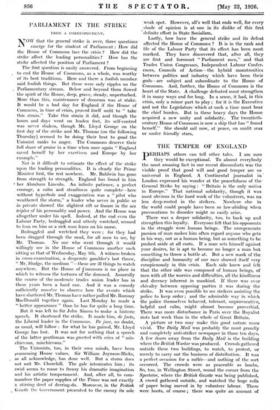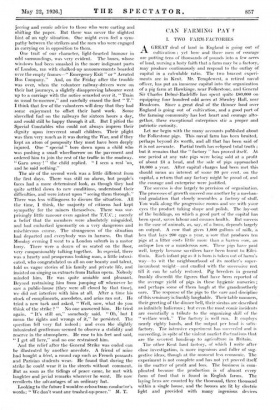THE TEMPER OF ENGLAND
pERHAPS others can tell other tales. I am sure they would be exceptional. To almost everybody the most amazing fact in our recent discomforts was the visible proof that good will and good temper are so universal in England. A Continental journalist in London expressed his wonder at the peacefulness of the General Strike by saying : " Britain is the only nation in Europe." That national solidarity,. though it was most obvious in the hard work of the volunteers, was no less deep-rooted in the strikers. Nowhere else in the world could people have been so law-abiding when provocations to disorder might so easily arise.
There was a deeper solidarity, too, to back up and strengthen this loyalty. Everyone felt that his opponents in the struggle were human beings. The unregenerate passion of man makes him often regard anyone who gets in his way, not as a human being, but as something to be pushed aside at all costs. If a man sets himself against your desires, he is apt to become no longer a man but something to throw a bottle at. But a new mark of the discipline and humanity of our race showed itself very conspicuously in this crisis. Each side knew and felt that the other side was composed of human beings, of men with all the worries and difficulties, all the kindliness and decency inherent in mankind. If there was ever chivalry between opposing parties it was during the strike. It was even possible to see strikers assisting the police to keep order ; and the admirable way in which the police themselves behaved, tolerant, unprovocative, helpful and calm, might almost become proverbial. There was more disturbance in Paris over the Royalist riots last week than in the whole of Great Britain.
A picture or two may make this good nature more vivid. The Daily Mail was probably the most grandly and completely anti-striker newspaper in those ten days. A few doors away from the Daily Mail is the building where the British Worker was produced. Crowds gathered outside these two buildings, to watch, to protest, or merely to carry out the business of distribution. It was a perfect occasion for a mêlée—and nothing of the sort occurred. The crowds were as peaceable as lambs. So, too, in Wellington Street, round the corner from the Spectator, where the British Gazette was being published. A crowd gathered outside, and watched the huge rolls of paper being moved in by volunteer labour. There were hoots. of -course ; there was quite an amount of jeering and comic advice to those who were carting and shifting the paper. But there was never the slightest hint of an ugly situation. One might even feel a sym- pathy between the strikers and the men who were engaged in carrying on in opposition to them.
One trait of our character, light-hearted humour in odd surroundings, was very evident. The buses, whose windows had been smashed in the more indignant parts of London, ran with chalked-up announcements boarded over the empty frames—" Emergency Exit " or " Aerated Bus Company." And, on the Friday after the trouble was over, when the volunteer railway-drivers were on their last journeys, a slightly disapproving labourer went up to a carriage with the notice scrawled over it, " Train as usual to-morrow," and carefully erased the first " T." I think that few of the volunteers will deny that they had Some enjoyment to offset their hard work. Some shovelled fuel on the railways for sixteen hours a day, and could still be happy through it all. But I pitied the Special Constables who could not always impress their dignity upon irreverent small children. Their plight was then very much as it was during the War, and if they kept an atom of pomposity they must have been deeply injured. One " special " bore down upon a child who was pushing a small wheelbarrow on the pavement and ordered him to join the rest of the traffic in the roadway. " Gam away ! " the child replied. " I seen a real 'un, and he said nothing."
The air of the second week was a little different from the first days. There was still no alarm, but people's faces had a more determined look, as though they had quite settled down to new conditions, understood their difficulties, and were intent upon " seeing them through." There was less willingness to discuss the situation. All the time, I think, the majority of citizens had kept sympathy for the miners themselves. There was sur- prisingly little rancour even against the T.U.C. ; merely a belief that the members were absolutely misguided, and had embarked ignorantly on a very dangerous and mischievous course. The strangeness of the situation had departed and everybody was in harness. On that Monday evening I went to a London suburb in a motor lorry. There were a dozen of us seated on the floor, very companionably talking together. In especial, there was a hearty and prosperous looking man, a little intoxi- cated, who congratulated us all on our beauty and talent, told us vague stories of his family and private life, and insisted on singing us extracts from Italian opera. Nobody minded him. He was quite amiable and pleasant. Beyond restraining him from jumping off whenever he saw a public-house (they were all closed by that time), we -did not interfere -with him at all. After a time his stock of compliments, anecdotes, and arias ran out. He tried a new tack and asked, " Well, now, what do you think of the strike ? " No one answered him. He tried again. " It's still on," somebody said. " Oh,' but I Mean the rights and wrongs of it," he persisted. The question fell very • flat indeed ; and even the slightly intoxicated gentleman-seemed to observe a stolidity and reserve in the atmosphere., He rose to his feet and said, " I get off here," and no one restrained him.
And the relief after the General Strike was ended can be illustrated by another anecdote. A friend of mine had bought a beret, a round cap such as French peasants and Parisian students wear. He found that during the strike he could wear it in the streets without comment. But as soon as the tidings of peace came, he met with laughter and jovial remarks wherever he went. He now recollects the advantages of an ordinary hat. • :Looking to the future I would-re-echo a tram conductor's words : " We don't want any trashed-up peace." M. T.















































 Previous page
Previous page